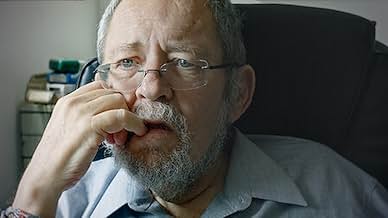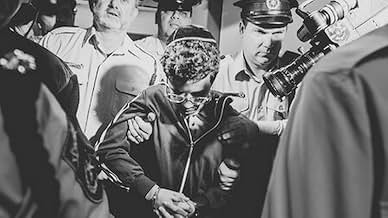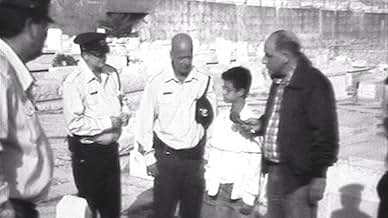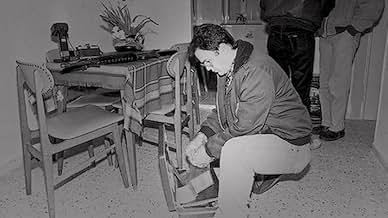CALIFICACIÓN DE IMDb
5.3/10
1.9 k
TU CALIFICACIÓN
En la Jerusalén de 1986 un niño de 14 años le dispara a quemarropa a su familia. A día de hoy las investigaciones siguen dejando muchas preguntas.En la Jerusalén de 1986 un niño de 14 años le dispara a quemarropa a su familia. A día de hoy las investigaciones siguen dejando muchas preguntas.En la Jerusalén de 1986 un niño de 14 años le dispara a quemarropa a su familia. A día de hoy las investigaciones siguen dejando muchas preguntas.
Explorar episodios
Opiniones destacadas
The biggest issue I have with this docuseries is the interview process - or at least what's visible to us. The questions are closed-ended or loaded with preconceptions or not provocative enough. It's like just seeking confirmation for whatever the interviewees had planned to say. A good interviewer should be both provocative and able to put people at ease so that interviewees would reveal more of what they're thinking/feeling (there are a few brief moments in which they managed to do that, but the rest of the interview is just a disappointment).
Also, they should always press for something more concrete from the interviewees, especially those considered to be experts or authorities - there's a lot of flowery language and swelling emotions, but not much substance. Like the lawyer who thinks he knew the motive, sure, but maybe wonder why his opinion holds any weight as he's not a psychiatrist? Or how he drew his conclusions? Or the psychiatrist, who admitted we have better understanding of mental states now than before, sure, what are the developments? What are the studies, terminologies, examples, etc? What are the philosophies on children crimes, mental health, family dynamics, military, gun control, Israeli state at that time, etc?
For me, there are two possible reasons why he could've committed such heinous crimes - one influenced by external forces, and the other internal. External forces could be: abuses sustained by him or any of his family members (little evidence of that), delirium caused by rage or any extreme emotion (not found), or brain tumours (for example, see Charles Whitman; even though this is internal of the murderer, it's out of his control, hence can be considered as external, this isn't mentioned in the show).
Then, there are the potential internal forces: narcissism, psychopathy, etc. One might find it hard to imagine, but you're never in the head of a psychopath, the problem isn't that they think about doing evil things all the time, it's that evil deeds don't bother them because they're not emotionally affected by it. And one always seeks for outward traits of devil (as suggested by many authorities in the show), as if there's a stereotypical face caused by psychopathy. What are you looking for, a "666" tattoo? For instance, Chris Watts, who murdered his wife and daughters simply because he wanted to leave them behind and start a new life with another woman, he could also be thought as just a regular Joe. You would think the means are way too extreme for the ends, but that's not how they see it. One of my theories is that the murderer actually felt suffocated by the attention and affection that he's showered with, and could be feeling like everyone's baby, which he despised (the journalist - if she could be trusted - mentioned something along the lines that he felt that he could only be a real grown up without his family).
Lastly, there are the technical parts... first, why is it cut into 4 short episodes? Is it necessary? Or it makes the blatant repetitions of images and sentiments less egregious? Then the narrative, music... are all quite hackneyed. They aren't bad, just a little pedestrian for such a compelling story. The show seems like just a cool presentation of what people can already guess/know, they should ask more probing questions, shine light on more perspectives (with real studies to back it up). As it stands, it seems more like a he-said-she-said gossip story.
Also, they should always press for something more concrete from the interviewees, especially those considered to be experts or authorities - there's a lot of flowery language and swelling emotions, but not much substance. Like the lawyer who thinks he knew the motive, sure, but maybe wonder why his opinion holds any weight as he's not a psychiatrist? Or how he drew his conclusions? Or the psychiatrist, who admitted we have better understanding of mental states now than before, sure, what are the developments? What are the studies, terminologies, examples, etc? What are the philosophies on children crimes, mental health, family dynamics, military, gun control, Israeli state at that time, etc?
For me, there are two possible reasons why he could've committed such heinous crimes - one influenced by external forces, and the other internal. External forces could be: abuses sustained by him or any of his family members (little evidence of that), delirium caused by rage or any extreme emotion (not found), or brain tumours (for example, see Charles Whitman; even though this is internal of the murderer, it's out of his control, hence can be considered as external, this isn't mentioned in the show).
Then, there are the potential internal forces: narcissism, psychopathy, etc. One might find it hard to imagine, but you're never in the head of a psychopath, the problem isn't that they think about doing evil things all the time, it's that evil deeds don't bother them because they're not emotionally affected by it. And one always seeks for outward traits of devil (as suggested by many authorities in the show), as if there's a stereotypical face caused by psychopathy. What are you looking for, a "666" tattoo? For instance, Chris Watts, who murdered his wife and daughters simply because he wanted to leave them behind and start a new life with another woman, he could also be thought as just a regular Joe. You would think the means are way too extreme for the ends, but that's not how they see it. One of my theories is that the murderer actually felt suffocated by the attention and affection that he's showered with, and could be feeling like everyone's baby, which he despised (the journalist - if she could be trusted - mentioned something along the lines that he felt that he could only be a real grown up without his family).
Lastly, there are the technical parts... first, why is it cut into 4 short episodes? Is it necessary? Or it makes the blatant repetitions of images and sentiments less egregious? Then the narrative, music... are all quite hackneyed. They aren't bad, just a little pedestrian for such a compelling story. The show seems like just a cool presentation of what people can already guess/know, they should ask more probing questions, shine light on more perspectives (with real studies to back it up). As it stands, it seems more like a he-said-she-said gossip story.
The case seems to be very interesting, this documentary isn't. Nothing missed if skipped.
There is one minute of interview and one minute of old photos and filmed scenes. Some of these scenes are not even real but staged. This alternation between information and footage continues for 4 ours. And even some of the interviews could be skipped completely and it wouldn't change the documentary to the bad.
'Investigative' journalists who don't know how to ask questions. A teenager could do better. Some of the interviews are like this (seriously like this): Interviewee: 'I know some details' Journalist: 'but you want tell me?' Interviewee: 'no' ... 5 seconds slience Journalist: 'if you tell me, would i understand more?' Interviewee: 'yes' ... 10 seconds silence Journalist: 'wow' ... cut WTF was this?!?!
There is one minute of interview and one minute of old photos and filmed scenes. Some of these scenes are not even real but staged. This alternation between information and footage continues for 4 ours. And even some of the interviews could be skipped completely and it wouldn't change the documentary to the bad.
'Investigative' journalists who don't know how to ask questions. A teenager could do better. Some of the interviews are like this (seriously like this): Interviewee: 'I know some details' Journalist: 'but you want tell me?' Interviewee: 'no' ... 5 seconds slience Journalist: 'if you tell me, would i understand more?' Interviewee: 'yes' ... 10 seconds silence Journalist: 'wow' ... cut WTF was this?!?!
A potentially fascinating case, but production levels that look like they came from someone's back shed, and a line of enquiry that goes nowhere and asks nothing, results in a lot of air and gossamer, and nothing else.
Don't bother watching this documentary series. It's boring and nobody they interviewed has any light to shed on the crime or the boy who committed it. It would have been better suited ti being a 90 minute one-off, if anything.
A wild story, no doubt. If it had just stuck to facts that would have been one thing. But they tried to be investigative, but didn't get a single thing out of anyone. Good use of archival footage, but could have been shorter, the defense attorney said nothing useful and instead wasted our time and the documenters'.
Selecciones populares
Inicia sesión para calificar y agrega a la lista de videos para obtener recomendaciones personalizadas
- How many seasons does The Motive have?Con tecnología de Alexa
Detalles
- Fecha de lanzamiento
- País de origen
- Sitio oficial
- Idioma
- También se conoce como
- The Motive
- Productora
- Ver más créditos de la compañía en IMDbPro
- Tiempo de ejecución35 minutos
- Color
Contribuir a esta página
Sugiere una edición o agrega el contenido que falta

Principales brechas de datos
By what name was El motivo (2020) officially released in India in English?
Responda

































